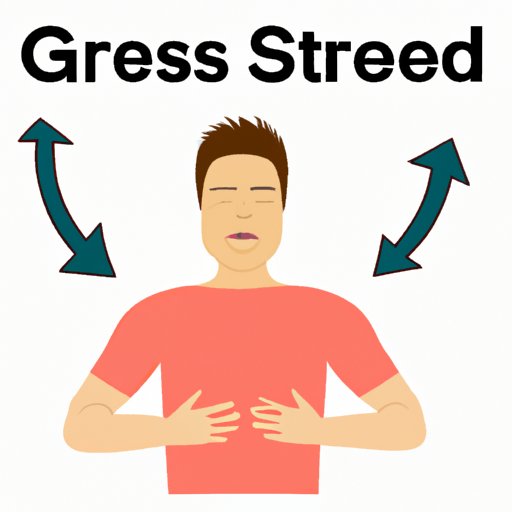
Introduction
Gastroesophageal Reflux Disease (GERD) is a chronic digestive disorder that occurs when stomach acid flows back into the esophagus, causing irritation and inflammation. Symptoms of GERD can include heartburn, chest pain, and difficulty swallowing. Stress has long been recognized as a potential trigger of GERD symptoms, but the link between stress and GERD is not well understood. In this article, we will dive deep into the research on the connection between stress and GERD symptoms.
Understanding the Link Between Stress and GERD: A Comprehensive Review of the Research
Studies have suggested that stress and anxiety can worsen GERD symptoms, but the exact mechanism by which this occurs remains unclear. One theory is that stress and anxiety increase the sensitivity of the esophagus, making it more susceptible to irritation from stomach acid. Another theory suggests that stress may affect the functioning of the lower esophageal sphincter (LES), a muscle that controls the flow of food and stomach acid into the stomach.
Research has also suggested a link between GERD and anxiety. One study found that people with anxiety were more likely to experience GERD symptoms, and another study found that people with GERD were more likely to experience anxiety and depression. This suggests that there may be a bidirectional relationship between anxiety and GERD symptoms.
How Emotional Stress Can Worsen GERD Symptoms: Tips for Managing Both
When we experience emotional stress, our body releases a hormone called cortisol, which, among other things, can cause the muscles in the digestive system to contract. This can lead to a buildup of pressure in the stomach, which can force stomach acid up into the esophagus, triggering GERD symptoms.
To manage both emotional stress and GERD symptoms, it is important to identify ways to reduce stress levels. Some tips for managing stress include practicing mindfulness, getting regular exercise, and engaging in relaxation techniques like massage and meditation. It is also important to avoid triggers for GERD symptoms, such as fatty or spicy foods, and to eat smaller, more frequent meals throughout the day.
Stress and Acid Reflux: A Common Pairing That Should Not be Ignored
In addition to triggering GERD symptoms, stress can also impact the effectiveness of medication used to treat acid reflux. One study found that stress was a significant predictor of poor response to acid reflux medication, suggesting that stress reduction may be an important component of treatment for GERD.
There are several risk factors that can increase the likelihood of developing stress-related GERD, including obesity, smoking, and a family history of digestive disorders. It is important to be aware of these risk factors and take steps to manage them for optimal digestive health.
The Mind-Gut Connection: How Stress Impacts Your Digestive Health and Triggers GERD
The brain and the digestive system are closely connected through a complex network of nerves, hormones, and chemical signals. This connection, known as the mind-gut connection, means that emotional stress can impact digestive health and trigger GERD symptoms. Stress can cause inflammation in the digestive tract, alter the balance of bacteria in the gut, and slow down digestion, all of which can contribute to GERD symptoms.
Top 5 Breathing Techniques to Alleviate Stress and GERD Symptoms Naturally
Breathing exercises can be a highly effective way to reduce stress levels and alleviate GERD symptoms naturally. Here are five breathing techniques to try:
- Deep breathing: Focus on breathing deeply and slowly, filling your lungs with air and exhaling fully.
- Belly breathing: Place one hand on your belly and breathe deeply into your abdomen, feeling it rise and fall with each breath.
- 4-7-8 breathing: Breathe in for four counts, hold for seven counts, and exhale for eight counts.
- Nadi Shodhana (Alternate Nostril Breathing): Use your fingers to alternate breathing in through one nostril and out through the other.
- Kapalabhati (Skull Shining Breath): Sit upright and breathe in deeply, then forcefully exhale, pumping your belly in and out.
Practicing these breathing techniques regularly can help alleviate stress and improve digestion, reducing the frequency and severity of GERD symptoms.
Stress-Reducing Activities That May Provide Relief for GERD Sufferers
There are many activities that can help to reduce stress levels and promote optimal digestive health. Some stress-reducing activities to try include:
- Exercise: Regular exercise can help reduce stress levels and promote healthy digestion.
- Yoga: Yoga combines physical movement with deep breathing and meditation, making it a great stress-relieving activity for GERD sufferers.
- Meditation: Meditation promotes relaxation and stress reduction, and has been shown to improve digestive health.
- Acupuncture: Acupuncture can help relieve stress and reduce GERD symptoms by promoting relaxation and improving digestion.
- Aromatherapy: Essential oils like lavender and peppermint can help promote relaxation and relieve stress, reducing the frequency and severity of GERD symptoms.
It is important to find stress-reducing activities that work for you and incorporate them into your daily routine to minimize GERD symptoms.
Conclusion
Stress can have a significant impact on GERD symptoms, and it is important to take steps to manage both emotional stress and GERD symptoms for optimal digestive health. By understanding the link between stress and GERD, practicing stress-reducing activities, and incorporating natural techniques like breathing exercises, sufferers of GERD can take control of their health and improve their quality of life.




